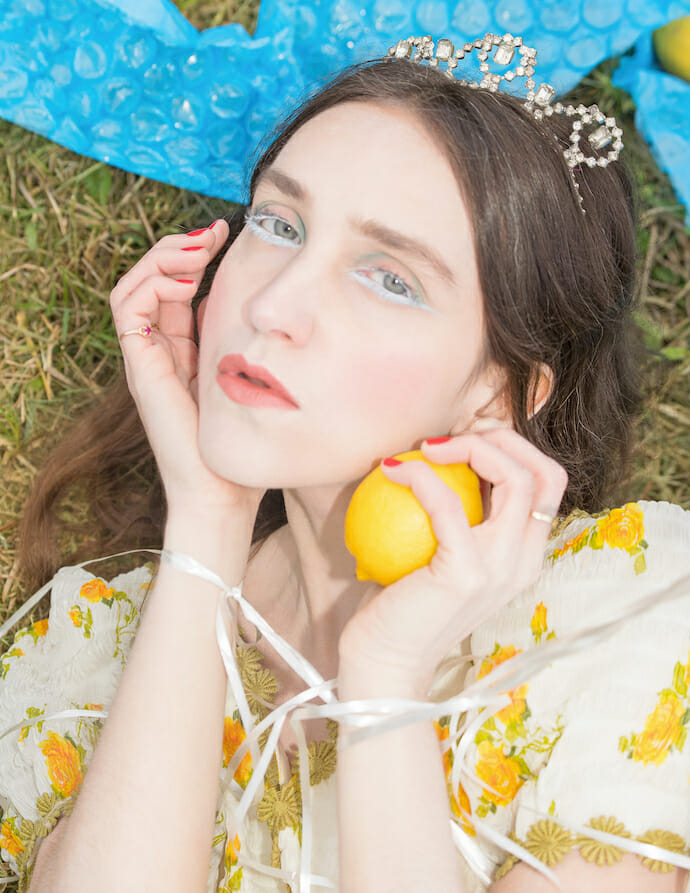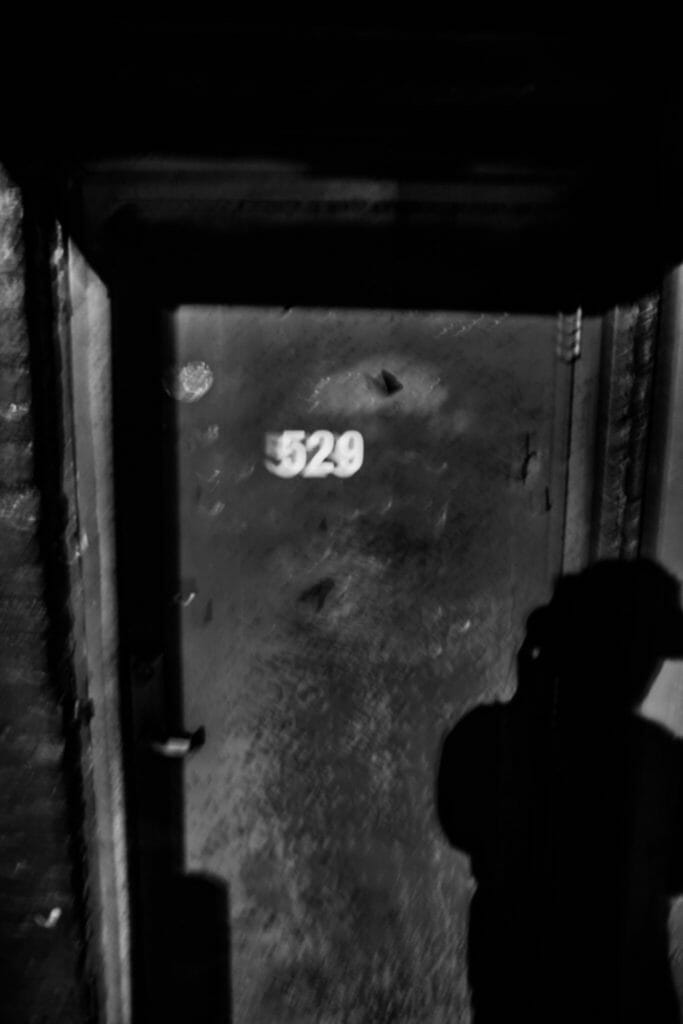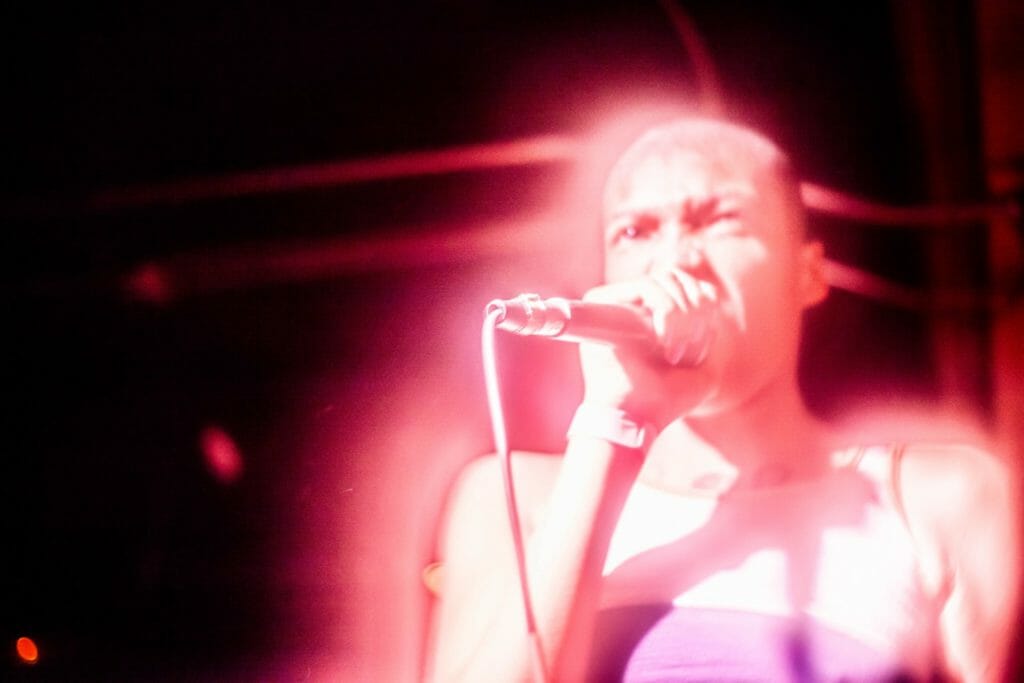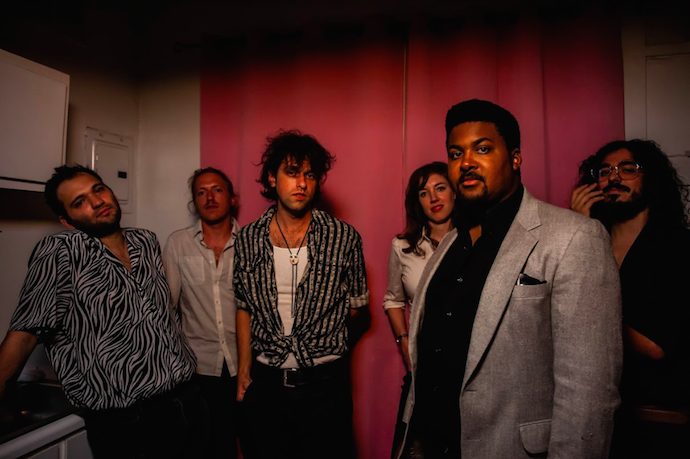In her debut release, Weekday Weekend (self-released on Aug. 23, 2019), Atlanta-based solo artist Nadia Marie displays an emotional potency with unnerving instability.

In a small unmarked guitar shop, I watched Nadia sit on a leather couch inspecting two vintage Les Paul guitars she\’d seen advertised online at a price to move. Two salesmen working in the shop gave us too much attention. They obviously wanted to make a sale and provide good customer service, but they were also clearly curious about who Nadia was. She was an undeniable spectacle in large purple crystal-encrusted Gucci sunglasses that obscured almost half of her face, and with the air of confidence many female musicians have to employ in music stores. The salesmen seemed particularly interested in what these guitars were for, if Nadia played in a band, and what music she played. They casually dropped that they were both unmarried. Nadia charismatically talked shop with the men to ensure they would be friendly, but also to let them know that she\’s not one to be jerked around. One listen to Weekday Weekend will also tell you this.
It doesn\’t take long to realize that something strange is bubbling under the surface of what appears to be a sugary pop record. And it’s not just strange; it’s alarming.
At first glance, Weekday Weekend is a succinct five-song pop release. It’s synthy, vocally driven, and full of attitude. There are compelling musical ideas materializing and some production that\’s a little rough around the edges, but a distinct pop sensibility in the songwriting makes it a solid first effort. However, once you start to sink your teeth into it, it doesn\’t take long to realize that something strange is bubbling under the surface of what appears to be a sugary pop record. And it’s not just strange; it’s alarming.
This album is the first many members of the alternative music scene in Atlanta are really learning about Nadia, but she is no newcomer. If you\’ve been lingering around in the last decade, you\’re probably already familiar. Nadia has been musically active most of her life, playing in alt-rock bands starting around 2003 at the age of 13. If you know where to dig in various corners of the internet, you can find Nadia performing over the years as a lead vocalist, plucking the banjo, playing indie rock rhythm guitar, rattling off energetic piano tunes, and virtuosically playing the harp. By 2013, she was fronting the punk band Curio Museum while gaining notoriety as a classical harpist. Nadia\’s musical career was just starting to take full form.
This halted in 2013 when Nadia was in an accident that left her with amnesia. This was also when the work of Weekday Weekend began.
All of the songwriting and recording of Weekday Weekend occurred on an iPad while Nadia was on bedrest recovering from her accident. Occupying her time and retraining her brain to perform routine functions, she played and experimented with different sounds in Garageband to make recordings about her experience. With the title Weekday Weekend, she refers to her longer-than-expected recovery time and attempts to think of it as one extended, long weekend.
The handwritten liner notes in the record\’s 30-page CD booklet begin with the jarringly dramatic statement, “It feels as if I must have died a thousand deaths. I feel as if this record is a representation of one of those deaths.” Her notes give little detail about the accident—only that it was devastating and left her with “the inability to know who [she] was or the ability to communicate.”
It’s relevant to mention I met Nadia for the first time while visiting Atlanta in early 2018, about six months before I would make the city my permanent residence. She was an acquaintance of my current roommate, and I knew nothing about her. But we both immediately overshared with each other outside the Earl. Fast forward a year and a half later, and I now have a friend named Nadia who occasionally visits my house in the afternoons. She brings her dog, Colby, and gluten-free cookies. We chat about art and music and romance and fashion. I value the wisdom and consideration she gives when critiquing creative ideas I throw at her. She is one of the first to contact me if she notices I look wary in a picture on social media. She is supportive and genuine.
This, however, does not seem to be the same person gracing the stage at a Nadia Marie performance, nor the person who wrote Weekday Weekend. The work and world of Nadia Marie, the artist, feel like something else entirely.
Her live performance is a must-see experience steeped in theatrics, and no two shows are exactly the same. I have watched Nadia Marie open with an unofficially released song called “Victim Shit,” with the commanding lyric, “I\’m the closest to heaven that you\’ll ever get.” She revels in the words, partially flaunting and partly screaming the lines at their unpresent recipient. The ego-fueled line in itself is enough to be vulgar. However, it is sent to a new level of narcissism during performances in which her backing band performs the song while wearing cardboard masks of Nadia\’s face. It is not uncommon that at the end of her final song, in what appears to be an exercise of dominance, she walks off stage instead of leaving with her band as normal stage etiquette instructs.
At her CD release show in September, her merch table was decked out with key chains, pins, necklaces, and shirts, all with “Nadia Marie” scrawled across each in Barbie font. The most compelling piece of merchandise is a poster depicting Nadia sitting on a couch in a bikini and a cowboy hat. Here, she appears as a centerfold.
I watched as Nadia instructed a friend on how to man the merch table, mark down inventory, and use the card reader while a crowd of people came to inspect the goods on the table. Without any provocation, she further instructs, “Oh, and let everyone who buys a poster know that I will sign it for them.”
It is difficult to not dislike Nadia in these moments. My initial reaction is to think she lacks authenticity, considering the ego and the gall it takes to plaster her name and face on everything, to expect and assume her autograph will be asked for, and to boast in her lyrics.
Until I realized Nadia is in on it.
To understand Nadia Marie, you must be in on the secret, and then fully indulge it. She is inviting the audience to dive into this world with her in which she is a crowning pop diva deserving of your undivided attention. And the results are mind-boggling.

The notions of movement and space in Nadia Marie\’s work has become one of my greatest interests in her practice. The choreography of each show thus far has been, as Nadia says, “an act of rebellion.” Her movements are markedly erratic and sinewy, yet unsexy. There is an undeniable reference to the choreography of Kate Bush, a clear sonic and stylistic influence on Nadia. She shares Bush\’s tendency to dance in a way that directly contradicts traditional movement in pop music, but incorporates movement associated with classical dance and punk. She dances with the exaggeration and emotional potency of a young girl dancing in her bedroom mirror alone. Nadia Marie\’s presentation of herself is heavily wrapped up in this girlishness, and how it can be selfish, bitchy, sweet, and vulnerable all at once.
If Nadia has died a thousand deaths, and Weekday Weekend is one of those deaths, then this is a concentrated view of one scene in her life. But it is turned all the way up to 11. My thoughts on her lack of authenticity were washed away when I recontextualized her with this new information, and I cycled back around to find Nadia Marie\’s work incredibly vulnerable. Suddenly, her narcissism on-stage is not trite or senseless theatrics; it is a young woman taking back space for her own identity through any means necessary. Every aspect of her work becomes a portrait of extreme femininity exaggerated to the point of an unseemly caricature. This is no longer your run-of-the-mill musical performance, but a performance of extreme kitsch.
However, there is still the issue of the very dark place from which Weekday Weekend comes. There is a shroud of mystery in her story that is undeniable, and to many, unbelievable. With the performance of fame and femininity paired with her sudden accident and amnesia, the blurring of identity and trust is logical. But the loss of identity and trust results in chaos, and that chaotic energy seeps out of every pore of Nadia Marie\’s work. She presents us with a narrative, and the personal mythology of Nadia Marie is all that is needed to place and consume the narrative presented in Weekday Weekend. The album’s backstory and relevance of truth are, to some extent, unnecessary, as the lack of detail only enhances the curiosity.
However, upon learning Nadia’s story, which is the stuff of a soap opera or a paperback thriller, the songs on Weekday Weekend shift from generic synth-pop territory to a far more unsettling place.
Beneath its sugary coats, there is a distinct lyrical anger in Weekday Weekend, particularly evident in the single “Two Things” with a chorus of “I never want to hear my name come out of your mouth / I never want to see your face around my town / I\’ve been brought here to stay / Get out of my way.” Pain is there, but it is always accompanied by an ever-present ego that always drives the point home that Nadia Marie, as our narrator, will come out on top.
Album closer “Yes / No” has often served as a live performance closer. And for good reason: it pushes and pulls, both structurally and emotionally in the most dynamic way the album has to offer. It also seems to take a page right out of Yeah Yeah Yeahs\’ playbook for ballads such as “Maps” or “Cheated Hearts” in its combination of synth pop and alt-rock conventions. There is a sinister quality to “Yes / No” in its instrumental and lyrical tension. It starts like a dreamy love song, but the final verse describes a dark scene: “Wake up with and you\’re on the floor / There\’s blood in my hair, leaves and dirt / I\’m laughing now, turn, side of cheek / say \’yes, no, never, yes,\’” building into a final reminder of fear and disorder.
But by far, the standout song of this record is its title track. Situated in the center of the album, it’s an effective thesis and is the most successfully executed piece. Though it never builds into anything excessively dramatic or grandiose musically, it plays through with a consistent strength and sweetness. It also serves as the greatest reminder on the record that the entirety of the work was created and written in the context of Nadia recovering from amnesia. It has a slightly different treatment than the rest of the album: the vocals are at their most skilled and tender, backing vocals are competing to be heard against the main melody, and the fact that the majority of the album was recorded on an iPad becomes more evident. We also get the uniquely heartbreaking line, “When I\’m with you / I forget about forgetting.”
She said once the ability to make music returned, “Two albums just poured out of me.”
Though the initial burst of songwriting during Nadia\’s recovery was a helpful tool, it was not sustainable. The music making process stopped soon after it began in 2013, and she shelved the songs for the next five years. Nadia has often described to me that music felt foreign to her in that time; so did her previous visual art practice of ceramics and sculpting when she returned to finish her BFA in Art. She instead began photography and research-based art, often dealing with femininity and identity. Nadia did not start writing music again until 2018, slowly releasing songs to her Soundcloud. She said once the ability to make music returned, “Two albums just poured out of me.”
It\’s nice to think of this chapter of Nadia\’s life being over and neatly wrapped up with Weekday Weekend finally being released. However, the circumstances of the record and the chaos surrounding Nadia Marie feel ever-present.
A few days after our initial meeting to talk about the record, I received a call from Nadia while I was at work. I called her back, and she answered with a markedly feeble voice. She informed me that she\’d sustained an eye injury that tore her cornea and asked if I\’d come over. Our last meeting revolved around business and Nadia Marie projects, but I walked into her room to find just Nadia. She had on Kate Spade sunglasses and a handkerchief covering her bad eye while lying in bed watching something like “Gossip Girl” or “Sex in the City.” Loopy from pain meds, she asked me to supervise her while she heated up her La Fonda leftovers we\’d gotten together earlier in the week. I helped send messages to cancel her photo and video shoots in the coming days, and it was clear she saw it as another setback in her work. She groggily described the fear of being right on the edge of something big and it all crashing around her again. Nadia said, “I\’ve seen this all before,” while mindlessly drawing waves in the air with her finger in the shape of a rollercoaster.
When I asked Nadia what is next, now that Weekday Weekend has finally been released after five years of sitting on these songs, she described a plan that let me know she\’s not anticipating being relegated to the Atlanta alternative music scene for long. She\’s circumventing common music venues by playing exclusively in abandoned buildings and churches, is currently writing and recording two more records, and making music videos. Nadia Marie may presently be performing a caricature of fame now, but if her debut is any indication of the future, this will become more warranted in time.
Back in the guitar shop, hyper-aware that Nadia might want to haggle, I stayed mostly silent to not reveal her interest in buying. After some time, a third salesman jovially approached me and asked, “How did you end up dragged here?” He meant to be friendly, but I was immediately offended. Neither Nadia or I are strangers to a guitar shop. However, I realized I starkly contrasted the spectacle of Nadia as her austerely-dressed, quiet companion. So, I fed the curiosity of the situation and Nadia\’s performed persona. I wanted to feed it. I’d fallen prey to both the manufactured world and reality of Nadia Marie. Looking down at my phone as if the question was beneath me, and that my answer should be obvious, I flatly replied, “Oh, I\’m writing a feature on Nadia Marie.”
He said nothing. Nothing was purchased that day.
Nadia Marie\’s next performance will be on Thurs., Feb. 6, 2020 at 575 Boulevard SE, Atlanta, Ga., 30312. Yes, it’s an abandoned church.




